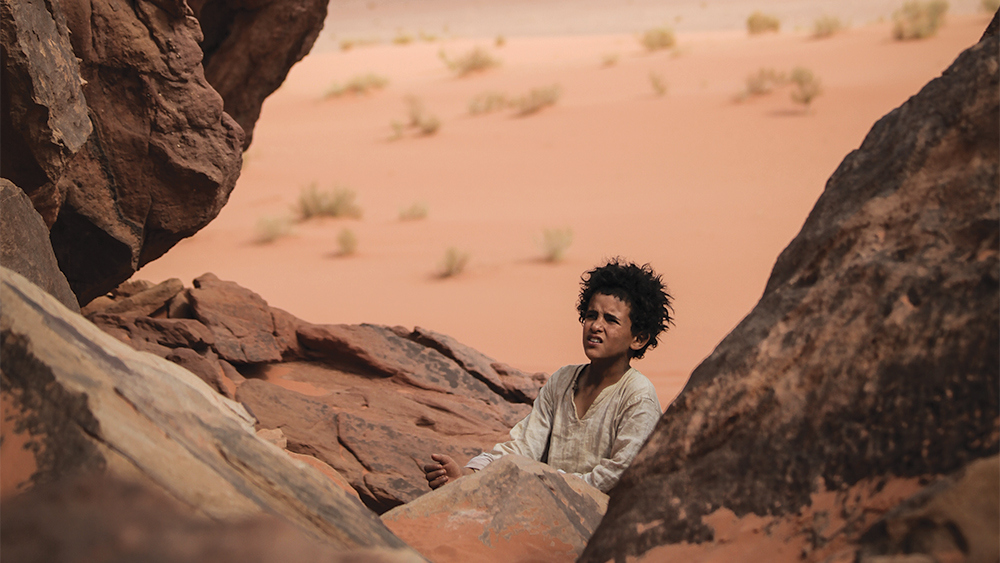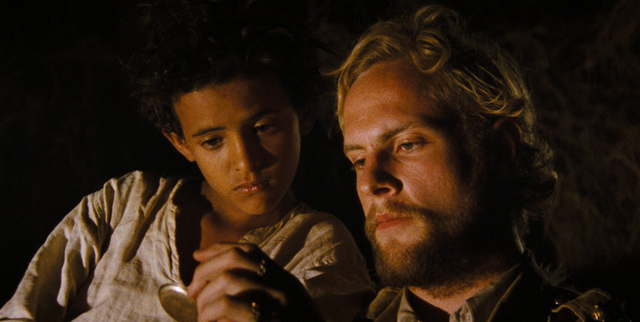The epic and the intimate combine impressively in Jordanian director Naji Abu Nowar’s debut feature Theeb. The epic is there is the scale of the stunning desert landscapes that are the backdrop – though the desert itself almost feels like a character here, and generic allusions to the Western abound – to his World War One story of complicated Bedouin loyalties played out on the edges of the Ottoman Empire. The intimate is found in the close bonds that dictate characters’ behaviour, and particularly in the very subtly textured role of the film’s eponymous main character.
Abu Nowar has drawn out a multi-faceted jewel of a performance from the non-professional Jacir Eid as his young hero, whose face, topped by its mop of unruly hair, evinces evocative innocence. He’s named after the Bedouin word for “wolf”, which has strong associations with proving achievement in that culture, and Theeb is determined to live up to such expectations when we first see him at his father’s grave. For now though he’s living the traditional tribal life, learning from the example of elder brother Hussein (Salameh Hussein, with Eid, main picture): the greater part of Theeb’s cast is non-professional, and these two are cousins in real life, the degree of playful intimacy between them absolutely natural. An early scene in which Theeb first offers to kill a sheep, and then declines, passing the task back to his brother, captures beautifully how, at the age, we guess, of around 10, he’s on the very cusp of accepting adult responsibilities: the action of the film follows his effective coming-of-age.
The desert is now dangerous as much for brigandry as for its harsh terrain
The tribe’s traditional role has been as pilgrim guides, escorting travellers to Mecca across the hostile desert, but changing times – Abu Nowar plays nicely on that theme, in parallel with his hero’s own development – and particularly the opening of the Hejaz railway have made that occupation largely obsolete. The desert is now dangerous as much for brigandry as for its harsh terrain, and the circumstances of the European war have added new complications to traditional networks of allegiance.
But Theeb’s world is as remote as possible from any such wider context. All that changes with the arrival of a British officer (Jack Fox, pictured below right) and his escort at the family camp, where he’s greeted with the traditions of hospitality, Hussein deputed to guide them on to their next destination, a well in the desert. Theeb is determined to follow. Fox is a distant, strict figure, angry at the boy’s curiosity, while Theeb is somehow enthralled by the stranger’s presence and the things he has brought along with him. We learn that Fox’s character has a rendezvous with a group of locals, and British viewers should have little trouble making the association, via Lawrence of Arabia (David Lean’s film was set in some of the same Wadi Rum terrain as Theeb), that he’s there as a saboteur, to disrupt the railway line.
 Their journey across this rough, flat landscape surrounded by rocky escarpments rising in the distance is engrossing – we understand how camels have come to be known as “ships of the desert” – but its mood gradually changes, and a mounting sense of threat appears. Conflict arises suddenly, but its impact is extended through an unsettling night scene in which Theeb and his brother, in hiding, are haunted by their opponents’ taunts ringing around the rocky canyon that shelters them.
Their journey across this rough, flat landscape surrounded by rocky escarpments rising in the distance is engrossing – we understand how camels have come to be known as “ships of the desert” – but its mood gradually changes, and a mounting sense of threat appears. Conflict arises suddenly, but its impact is extended through an unsettling night scene in which Theeb and his brother, in hiding, are haunted by their opponents’ taunts ringing around the rocky canyon that shelters them.
Abu Nowar follows through with accomplishment, as Theeb, thrown into the enforced company of a stranger, is brought to a new awareness of the balance between the need for survival, allied somehow to accompanying bonds of allegiance, and an instinct for vengeance. The bonds of honour that are finally observed by this child who has so quickly been forced into a new maturity are universal ones: Theeb’s final deed has an inevitability that seems as natural in this Bedouin world as it might be in, say, William Faulkner’s Deep South.
 Theeb won Abu Nowar the best director prize in the Horizons section at last year’s Venice film festival, and its assurance should make sure we hear more of him again before long. Though born in Britain, Abu Nowar’s long been based in his native Jordan, and seems to fit in with a new generation of Arab filmmakers – Annemarie Jacir of When I Saw You and Haifaa Al-Mansour with Wajdja spring to mind – who have developed their talent in contexts overlapping with that of the West, in Abu Nowar’s case initial training that was an offshoot of Sundance, followed by encouragement through the Gulf festivals that have appeared, again with foreign support, in recent years (Theeb acknowledges assistance from the Doha and Abu Dhabi events).
Theeb won Abu Nowar the best director prize in the Horizons section at last year’s Venice film festival, and its assurance should make sure we hear more of him again before long. Though born in Britain, Abu Nowar’s long been based in his native Jordan, and seems to fit in with a new generation of Arab filmmakers – Annemarie Jacir of When I Saw You and Haifaa Al-Mansour with Wajdja spring to mind – who have developed their talent in contexts overlapping with that of the West, in Abu Nowar’s case initial training that was an offshoot of Sundance, followed by encouragement through the Gulf festivals that have appeared, again with foreign support, in recent years (Theeb acknowledges assistance from the Doha and Abu Dhabi events).
Abu Nowar’s film draws us into a traditional world, the details of which convince, and our engagement, not least through the child’s perspective, is much more than just ethnographicl: the director and his crew spent considerable time in Jordan’s Bedouin community, involving is members in the production, as well as casting the unknowns from that world who acquit themselves so well here. Inevitably there was an element of outside involvement – Jordan has a small film world only, more accustomed to working with outside directors who go there for the landscapes rather than native talent – in the form of Wolfgang Thaler’s glowing widescreen cinematography, and a score from Jerry Lane that, while drawing on local motifs, primarily engages through elements, like lamenting cellos, more familiar from the West. It’s a more than believable combination, however, and one that looks promising for future exploration.
- Theeb on limited release from 14 August, with Q&A screening with the director Naji Abu Nowar that day in London, followed by Glasgow, Edinburgh, Bristol
Overleaf: watch the trailer for Theeb
Q&A screening with the director Naji Abu Nowar Fri 14 August Curzon Bloomsbury. Tickets available here
more Q&A screenings Sun 16th 7.15pm GFT Glasgow, Mon 17 8.20pm Filmhouse Edinburgh, Tue 18 5.50pm Watershed Bristol
- See more at: http://www.newwavefilms.co.uk/view-film-detail.html?viewListing=MTI1&cat=1#sthash.V0HAecEL.dpuf
Q&A screening with the director Naji Abu Nowar Fri 14 August Curzon Bloomsbury. Tickets available here
more Q&A screenings Sun 16th 7.15pm GFT Glasgow, Mon 17 8.20pm Filmhouse Edinburgh, Tue 18 5.50pm Watershed Bristol
- See more at: http://www.newwavefilms.co.uk/view-film-detail.html?viewListing=MTI1&cat=1#sthash.V0HAecEL.dpuf














Add comment